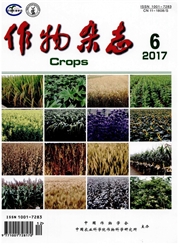

 中文摘要:
中文摘要:
研究了β-1,3-葡聚寡糖对水稻生理特性及产量和品质性状的影响,探讨了不同浓度β-1,3-葡聚寡糖处理水稻叶片SPAD值、根系伤流量、丙二醛含量及稻米产量和品质的变化。结果表明:在孕穗期和抽穗期施用适宜浓度的β-1,3-葡聚寡糖可以有效提高水稻叶片SPAD值和根系伤流量,降低丙二醛含量,并具有提高稻谷产量和改善稻米品质的作用。其中,SPAD值和根系伤流量的变化说明β-1,3-葡聚寡糖具有提高水稻叶绿素含量和增强根系活力的作用;而丙二醛含量的降低则间接表明β-1,3-葡聚寡糖在提高水稻抗病能力等方面可能也具有一定作用,还有待进一步深入研究。本研究结果可为β-1,3-葡聚寡糖在水稻生产中的应用提供参考,对促进生物农业的健康快速发展具有重要意义。
 英文摘要:
英文摘要:
In this paper,the effects of β-1,3-gluco-oligosaccharide on rice physiological characteristics,yield and quality were studied,and the changes of SPAD value,root bleaching quantity,malondialdehyde content,rice yield and quality by different concentration treatments of β-1,3-gluco-oligosaccharide were discussed. The results showed that the application of suitable concentration of β-1,3-gluco-oligosaccharide could effectively improve rice leaf SPAD values and root bleaching quantity,reduce malondialdehyde content at booting stage and heading stage,and it could also increase rice yield and improve rice quality. The change of SPAD value and root bleaching quantity showed that β-1,3-gluco-oligosaccharide had some functions in increasing chlorophyll content of rice and enhancing root activity. The decrease of malondialdehyde content indicatesd that β-1,3-gluco-oligosaccharide may improve rice disease resistance,but it remains for further research. The results of the study provide a reference for the application of β-1,3-gluco-oligosaccharide in rice production. It is important to accelerate the development of biological agriculture.
 同期刊论文项目
同期刊论文项目
 同项目期刊论文
同项目期刊论文
 Cloning and characterization of a novel NAD(+)-dependent glyceraldehyde-3-phosphate dehydrogenase ge
Cloning and characterization of a novel NAD(+)-dependent glyceraldehyde-3-phosphate dehydrogenase ge A high salt tolerant neutral protease from Aspergillus Oryzae: Purification, characterization and ki
A high salt tolerant neutral protease from Aspergillus Oryzae: Purification, characterization and ki NtrC-dependent regulatory network for curdlan biosynthesis in response to nitrogen limitation in Agr
NtrC-dependent regulatory network for curdlan biosynthesis in response to nitrogen limitation in Agr Purification and Characterization of a New Endo-beta-1,3-glucanase Exhibiting a High Specificity for
Purification and Characterization of a New Endo-beta-1,3-glucanase Exhibiting a High Specificity for An increase of curdlan productivity by integration of carbon/nitrogen sources control and sequencing
An increase of curdlan productivity by integration of carbon/nitrogen sources control and sequencing Enhancing pIFN-alpha Production and Process Stability in Fed-Batch Culture of Pichia pastoris by Con
Enhancing pIFN-alpha Production and Process Stability in Fed-Batch Culture of Pichia pastoris by Con Typing of Blood-Group Antigens on Neutral Oligosaccharides by Negative-Ion Electrospray Ionization T
Typing of Blood-Group Antigens on Neutral Oligosaccharides by Negative-Ion Electrospray Ionization T A new polysialic acid production process based on dual-stage pH control and fed-batch fermentation f
A new polysialic acid production process based on dual-stage pH control and fed-batch fermentation f A new effective process for production of curdlan oligosaccharides based on alkali-neutralization tr
A new effective process for production of curdlan oligosaccharides based on alkali-neutralization tr A novel osmotic pressure control fed-batch fermentation strategy for improvement of erythritol produ
A novel osmotic pressure control fed-batch fermentation strategy for improvement of erythritol produ Curdlan beta-1,3-Glucooligosaccharides Induce the Defense Responses against Phytophthora infestans I
Curdlan beta-1,3-Glucooligosaccharides Induce the Defense Responses against Phytophthora infestans I A new, quick, highly sensitive ultramicro-analysis method for the identification of fructose removed
A new, quick, highly sensitive ultramicro-analysis method for the identification of fructose removed Mechanism of Lentinan Hydrolysis Based on ESI-CID-MS/MS and Preparation of Full Series of Oligosacch
Mechanism of Lentinan Hydrolysis Based on ESI-CID-MS/MS and Preparation of Full Series of Oligosacch An unstructured kinetic model for the improvement of triterpenes production by Ganoderma lucidum G01
An unstructured kinetic model for the improvement of triterpenes production by Ganoderma lucidum G01 Influence of Sodium Chloride on Thermal Denaturation of a High-Salt-Tolerant Neutral Protease from A
Influence of Sodium Chloride on Thermal Denaturation of a High-Salt-Tolerant Neutral Protease from A Structure of oligosaccharide F21 derived from exopolysaccharide WL-26 produced by Sphingomonas sp AT
Structure of oligosaccharide F21 derived from exopolysaccharide WL-26 produced by Sphingomonas sp AT 期刊信息
期刊信息
